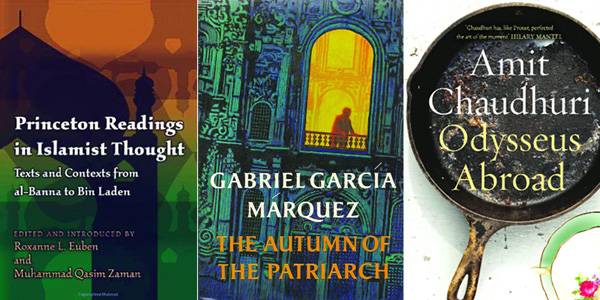
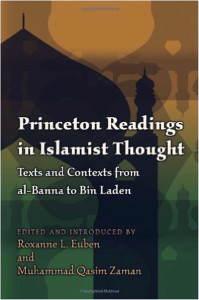
Princeton Readings in Islamic Thought
Edited and Introduced by Roxanne L. Euben and Muhammad Qasim Zaman
Princeton (paperback), 2009
PRs 2050
This anthology of key primary texts provides an unmatched introduction to Islamist political thought from the early twentieth century to the present, and serves as an invaluable guide through the storm of polemic, fear, and confusion that swirls around Islamism today. Roxanne Euben and Muhammad Qasim Zaman gather a broad selection of texts from influential Islamist thinkers and place these figures and their writings in their multifaceted political and historical contexts. The selections presented here in English translation include writings of Ayatollah Khomeini, Usama bin Laden, Muslim Brotherhood founder Hasan al-Banna, and Moroccan Islamist leader Nadia Yassine, as well as the Hamas charter, an interview with a Taliban commander, and the final testament of 9/11 hijacker Muhammad Ata.
Illuminating the content and political appeal of Islamist thought, this anthology brings into sharp relief the commonalities in Islamist arguments about gender, democracy, and violence, but it also reveals significant political and theological disagreements among thinkers too often grouped together and dismissed as extremists or terrorists. No other anthology better illustrates the diversity of Islamist thought, the complexity of its intellectual and political contexts, or the variety of ways in which it relates to other intellectual and religious trends in the contemporary Muslim world.
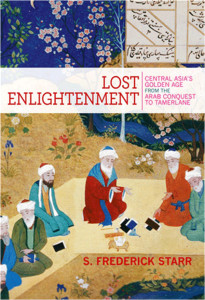
Lost Enlightenment: Central Asia’s Golden Age from the Arab Conquest to Tamerlane
S Frederick Starr
Harper Collins (paperback), 2015
PRs 1198
In this sweeping and richly illustrated history, S. Frederick Starr tells the fascinating but largely unknown story of Central Asia’s medieval enlightenment through the eventful lives and astonishing accomplishments of its greatest minds—remarkable figures who built a bridge to the modern world. Because nearly all of these figures wrote in Arabic, they were long assumed to have been Arabs. In fact, they were from Central Asia—drawn from the Persianate and Turkic peoples of a region that today extends from Kazakhstan southward through Afghanistan, and from the easternmost province of Iran through Xinjiang, China.
Lost Enlightenment recounts how, between the years 800 and 1200, Central Asia led the world in trade and economic development, the size and sophistication of its cities, the refinement of its arts, and, above all, in the advancement of knowledge in many fields. Central Asians achieved signal breakthroughs in astronomy, mathematics, geology, medicine, chemistry, music, social science, philosophy, and theology, among other subjects. They gave algebra its name, calculated the earth’s diameter with unprecedented precision, wrote the books that later defined European medicine, and penned some of the world’s greatest poetry. One scholar, working in Afghanistan, even predicted the existence of North and South America—five centuries before Columbus. Rarely in history has a more impressive group of polymaths appeared at one place and time. No wonder that their writings influenced European culture from the time of St. Thomas Aquinas down to the scientific revolution, and had a similarly deep impact in India and much of Asia.
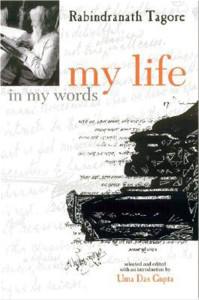
My Life in My Words
Rabindranath Tagore
Penguin (paperback), 2010
PRs 900
A unique autobiography that provides an incomparable insight into the mind of a genius The Renaissance man of modern India, Rabindranath Tagore put his country on the literary map of the world when he won the Nobel Prize for Literature in 1913. My Life in My Words is, quite literally, Tagore on Tagore. Uma Das Gupta draws upon the vast repertoire of Tagore’s writings to create a vivid portrait of the life and times of one of India’s most influential cultural icons. The result is a rare glimpse into the world of Tagore: his family of pioneering entrepreneurs who shaped his worldview; the personal tragedies that influenced some of his most eloquent verse; his groundbreaking work in education and social reform; his constant endeavour to bring about a synthesis of the East and the West and his humanitarian approach to politics; and his rise to the status of an international poet. Meticulously researched and sensitively edited, this unique autobiography provides an incomparable insight into the mind of a genius.
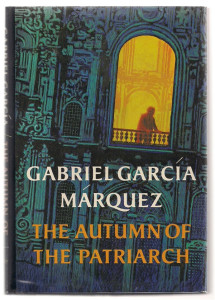
The Autumn of the Patriarch
Gabriel Garcia Marquez
Penguin (paperback), 2014
PRs 600
‘Over the weekend the vultures got into the presidential palace by pecking through the screens on the balcony windows and the flapping of their wings stirred up the stagnant time inside’
As the citizens of an unnamed Caribbean nation creep through dusty corridors in search of their tyrannical leader, they cannot comprehend that the frail and withered man lying dead on the floor can be the self-styled General of the Universe. Their arrogant, manically violent leader, known for serving up traitors to dinner guests and drowning young children at sea, can surely not die the humiliating death of a mere mortal?
Tracing the demands of a man whose egocentric excesses mask the loneliness of isolation and whose lies have become so ingrained that they are indistinguishable from truth, Márquez has created a fantastical portrait of despotism that rings with an air of reality.
Reviews
‘Delights with its quirky humanity and black humour and impresses by its total originality’ – Vogue
‘Captures perfectly the moral squalor and political paralysis that enshrouds a society awaiting the death of a long-term dictator’ – Guardian
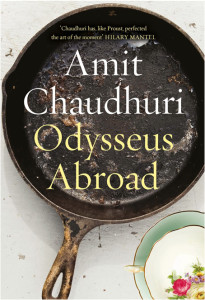
Odysseus Abroad
Amit Chaudhuri
Penguin (paperback), 2015
PRs 798
From the widely acclaimed writer, a beguiling new novel, at once wistful and ribald, about a day in the life of two Indian men in London—a university student and his bachelor uncle—each coping in his own way with alienation, solitariness, and the very art of living.
It is 1985. Twenty-two-year-old Ananda has been in London for two years, practicing at being a poet. He’s homesick, thinks of himself as an inveterate outsider, and yet he can’t help feeling that there’s something romantic, even poetic, in his isolation. His uncle, Radhesh, a magnificent failure who lives in genteel impoverishment and celibacy, has been in London for nearly three decades. Odysseus Abroad follows them on one of their weekly, familiar forays about town. The narrative surface has the sensual richness that has graced all of Amit Chaudhuri’s work. But the great charm and depth of the novel reside in Ananda’s far-ranging ruminations (into the triangle between his mother, father, and Radhesh—his mother’s brother, his father’s best friend; his Sylheti/Bengali ancestry; the ambitions and pressures that rest on his shoulders); in Radhesh’s often artfully wielded idiosyncrasies; and in the spiky, needful, sometimes comical, yet ultimately loving connection between the two men.

